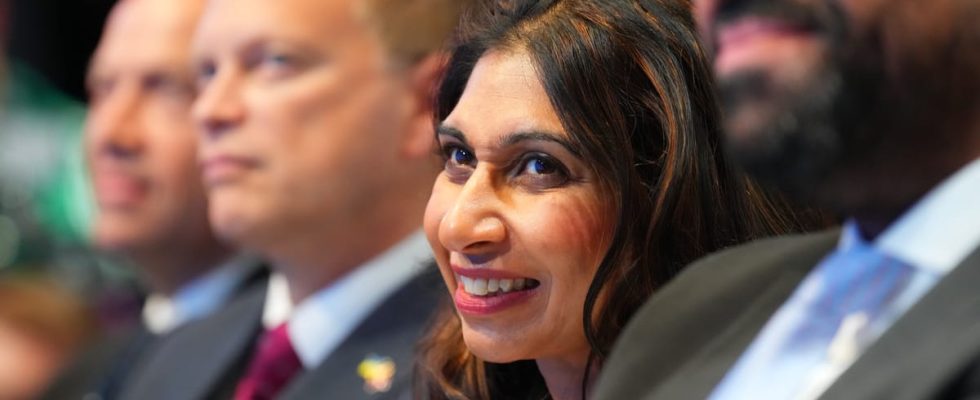She’s the most divisive British politician of the age; the scourge of left-wing intelligencia whose fire and brimstone rhetoric on immigration makes even those within her own party flinch.
Suella Braverman’s suggestion this week that charities be banned from giving tents to the homeless was only the latest radical policy proposal from the U.K. Home Secretary to receive widespread liberal criticism — with even Tory Cabinet colleagues distancing themselves from her remarks.
For the second time in recent months, a number of fellow Tory MPs complained to the Conservative Party about her rhetoric; back in September, her claim that immigrants were pretending to be gay in order to be granted asylum drew condemnation by, among many others, the singer Elton John.
In the past she has talked of migrant arrivals as “an invasion” — a phrase described by Archbishop of Canterbury Justin Welby as “dangerous rhetoric.”
Some speculate the ambitious Braverman’s sole aim was to upset left-wing opinion and so enhance her standing with the grassroots Tory members — a famously right-wing cohort — who will decide a future Tory leadership contest.
If so, she likely succeeded. Such is the opprobrium with which Braverman is seen in some quarters that a recent theater revival of the famous Spitting Image satirical show lampooned her as the possessed child from the 1970s horror movie, The Exorcist — a portrayal those around Braverman described as upsetting and unfair.
For in private, Braverman is invariably described by officials, aides and colleagues as charming. She said she was nervous about this profile, and politely thanked POLITICO for writing it.
So how did a friendly Cambridge graduate who studied in Paris and speaks fluent French become a Brexit-championing, anti-immigration zealot and anti-woke worrier? What do the contradictions in her biography mean for her barely-concealed ambitions to lead the country? And what does it say about British politics that her provocative brand of Conservatism might convince her party to back her for leader?
POLITICO spoke to more than a dozen people from various stages of Braverman’s life to better understand the U.K. home secretary. Most were granted anonymity to speak frankly about her character.
In the beginning
Braverman was born Sue-Ellen Cassiana Fernandes in April 1980, and grew up in Brent, a vibrant north London borough which demographic data shows is the most ethnically diverse in the country. In 2019 it became the first borough in the U.K. in which more than half the residents were born overseas.
Among this community of immigrants were Braverman’s parents, Christie and Uma Fernandes, a factory worker and nurse who strived to send their only child to a private secondary school on a partial scholarship. This was the late 1980s, and the couple were inspired by then-Tory PM Margaret Thatcher’s oratory about hard work.
“It was about empowerment, self responsibility, aspiration and civic participation,” one member of Braverman’s current team told POLITICO.
Christie, Braverman’s father, was born in Kenya and spent the early part of his life there as part of the Indian diaspora. In the early 1960s the family moved home to Goa, from where he emigrated to the U.K. in 1967, knowing no one and with just a few pounds in his pocket.
His story is one Braverman has told often — including in the speech which would win her selection to fight the parliamentary seat of Fareham in Hampshire, and in her maiden address to the House of Commons a few years later.
In Braverman’s mind, at least, her father’s origin story is a world away from that of those who today risk their lives to reach the Kent coast without legal documentation. Unlike those arriving on small boats, Christie Fernandes had a magic ticket as the child of a former British colony: a U.K. passport.
“What we have now is a very different scenario,” Braverman told the Daily Mail recently. “My parents didn’t get in a boat and cross the Channel, and didn’t come here illegally.”
Conservative peer Anne Jenkin, who knows both Braverman and her mother Uma, agrees her family’s attitude would have been different to many of today’s arrivals to the U.K.
“Her family will have wanted to absolutely become totally British, and felt a real sense of privilege to be here,” Jenkin said. “It’s about embracing this country and our culture and our values and making it yours. I think that’s what she would say is the difference.”
Others, however, see in Braverman’s vehement insistence of a moral difference between legal and illegal immigration a classic case of pulling up the drawbridge.
After Braverman used a high-profile speech in Washington D.C. in September to declare multiculturalism had “failed,” the Black Conservative commentator Albie Mankona tweeted: “The daughter of commonwealth migrants, in a biracial & multi religion marriage claims in absolute terms, that multiculturalism has failed when she & her family are a living multicultural civil nationalist success story. She should be using her story as a template for a national integration program.”
Queen Mary University of London Professor of Politics Tim Bale believes Braverman’s background is a factor in some of the negative responses to her policies and rhetoric.
“She is seen as someone from an ethnic minority who is taking a very hard line on immigration. That will always go down badly with a certain section of the commentariat,” he said.
Tough talking
Conversely, Bale also suggested Braverman’s race is to a degree an inoculating factor, giving her permission to talk tough on issues of race and migration in ways others might balk at. “There is an extent to which possibly she is used to make comments which a Caucasian Home Secretary might find more difficult to defend,” he said.
Braverman herself believes there is no contradiction in being from an ethnic minority and opposing mass immigration. The official quoted above who is close to the home secretary said: “Just because of her skin or heritage, doesn’t mean she has to be in favor of more migration or she can’t be in favor of lower migration.”
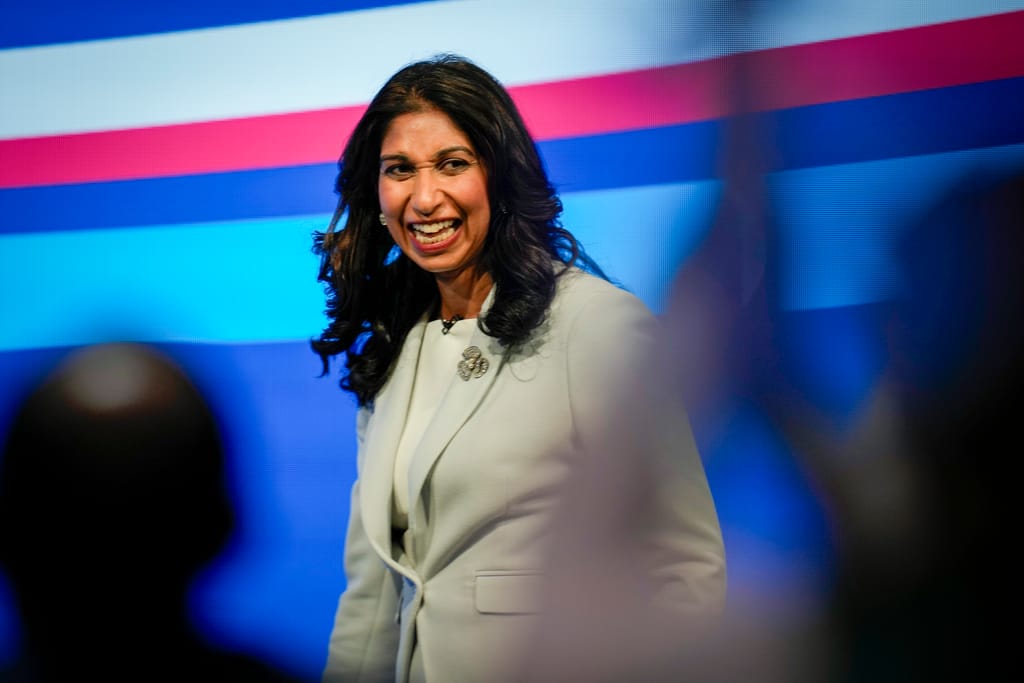
Braverman’s mother Uma was 18 when she came to the U.K. from Mauritius. She had relatives who fought for the British army during World War Two, giving her a direct connection to the U.K — and Braverman a belief that the British Empire was a force for good. Uma trained as a nurse, becoming an NHS matron at a primary care trust in west London.
Christie had been a civil servant in India, but would later tell the Times of India: “When I came to London, because of my color, I was given only blue collar factory work.”
He also experienced periods of unemployment, during which he volunteered for the Red Cross. Uma too began to do community work and was introduced to the local Conservative Party by a friend on the local council. Soon she “got the bug,” according to the official close to her, helping out at election time and eventually serving on Hillingdon Council as a Tory member for 16 years.
Jenkin, a family friend, said that as a result, Braverman was introduced to politics early: “She was absolutely brought up with the leaflets and all the rest of it at home.”
By now, Sue-Ellen, named after the lush wife of J.R. Ewing in the American oil baron soap opera Dallas, had become “Suella,” a nickname bestowed by a teacher at her primary school, Uxendon Manor in Kenton, who “didn’t like the hyphen.”
Suella took her father’s job losses hard, and told the member of her team quoted earlier she was determined to work hard at school to ensure nothing similar ever happened to her. The money was found to send her to the independent Heathfield School in Pinner, where she thrived.
At 18 Braverman was head girl and expected to perform well in her A-levels. Defying a teacher who suggested she apply to an all-women’s college at Cambridge — with the implication this would be easier to get in to — she instead accepted an invitation from a law tutor she had met on a Cambridge University open day to try his own college, Queens’.
Dreaming spires
It was a fateful decision, according to some who went on to study alongside her.
One contemporary told POLITICO: “Queens’ was quite a liberal-left college … very much a sort of Generation X attitude towards politics: we don’t like the Tories. And I wonder if that’s the potential genesis of why she became eventually so reactionary.
“In terms of her politics being really quite right wing, my sense is that she wouldn’t have felt natively at home there.”
Another former Queens’ student agrees, saying: “Delving into pop psychology, she must have felt a bit out of the water being at Queens’. She wasn’t particularly popular.”
A third Queens’ alumni says: “She had this reputation of being a figure of fun.
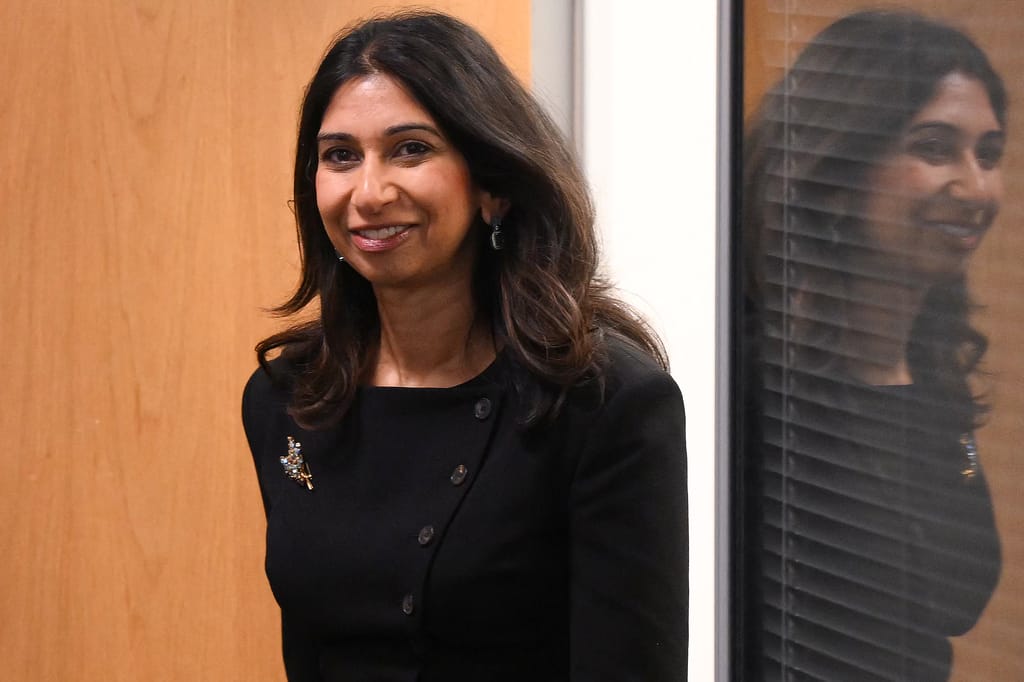
“There was a guy who used to go around college, when she’d walk into the bar, would sing her name in an overly dramatic way.”
All three former students described Queens’ as an “insular” place, where students socialized as well as studied, and the bar was the center of college life — a setup they felt Braverman seemed uncomfortable with.
The second former student said: “I don’t think she was desperately ever keen to court popularity, which in some ways is an admirable thing. That contrasts with some of her year group, people who would do all sorts of stupid things to get a laugh.”
Braverman herself agrees Queens’ had a drinking culture but rejects the characterization that she was unhappy or out of place as a Conservative. The team member quoted above insisted she maintained friendships with fellow students of all different political views and with none, and continued to see some of them socially for years after she left university.
She and her three fellow former students all agree that her focus socially was not on Queens’ but the university’s Conservative club, where fellow members included Robert Jenrick, who now works under her at the U.K. Home Office.
Scandal
It was in connection to this club that the then Suella Fernandes found herself at the center of a furor, after a fellow Queens’ student told the student newspaper, Varsity, that she had offered to buy him drinks in return for him voting for her to become club president.
When the affair hit Varsity’s front page, under the headline “Conservatives in corruption crisis,” it caused a full blown scandal.
For the three former students POLITICO spoke to, Braverman’s crime was not so much seeking to offer to buy a fellow student a drink — a fairly common practice in student politics — but that, when challenged by Varsity’s reporters, she denied knowing the person she was accused of bribing. It transpired he lived next door.
The second student said the response to the report was “mass hilarity and sensation. There wasn’t any sympathy.”
A week later, under the headline “Conservatives not in crisis,” Varsity published a series of letters, including one from Braverman, rejecting the original story. The matter — which might have been referred to the university authorities — went no further.
Braverman rejects the suggestion that the experience was a bruising one. She jokingly told POLITICO her main reaction was horror at the admittedly unflattering photograph on the front of the newspaper.
After Cambridge, Braverman studied at the Sorbonne as part of the Erasmus scheme, which allows students from across the EU to attend college in other member states. (Braverman’s Tory government would end U.K. membership of Erasmus following Brexit. Again, she sees no contradiction.)

Before taking up a place at law school in London, Braverman put herself forward for the Conservatives’ candidates’ list. Uma had already done the same, and in 2003 stood unsuccessfully in a by-election in the Labour/Liberal Democrat-dominated seat of Brent East. At one point Braverman considered a shot at the seat herself, but Uma told her: “You should let Mummy have a chance” first.
Two years later, and still a trainee barrister, Braverman was selected to fight the safe Labour seat of Leicester East in the 2005 general election. Her opponent was Keith Vaz, a high-profile Labour MP.
She wasn’t expected to win, and didn’t. But she had now fought her “no hoper” election, meaning she would be more likely to be considered for a safer seat by Tory HQ next time round.
Legal trouble
Braverman did her pupilage at the London office of No5 Chambers, a large Birmingham firm before moving on to 2–3 Gray’s Inn Square, now Cornerstone Barristers, where she specialized in town and country planning, housing and licensing.
Later, when she became attorney general in Boris Johnson’s government, Braverman’s legal chops would be the subject of derision from fellow lawyers, particularly after the eminent barrister Philip Kolvin rejected a claim on her CV that she had helped him write an authoritative legal text book.
An official who worked with her at this time insisted: “She was a decent, competent lawyer. She was on the attorney general’s panel of counsel that the government can go to for legal work when she was a lawyer in private practice, and that’s a competitive thing. Not everyone gets on it.”
But a second official from the same period said Braverman was seen as too inexperienced in the law and too political in the role of attorney general, which created a toxic situation. “It got into a position with the legal profession that whatever she did or said, they all hated her. It was kind of visceral and tribal.”
Desperate for a seat
When Braverman determined the time was right to seek a parliamentary seat in the run up to the 2015 election, she applied for more than 40 constituencies before eventually being adopted in Fareham.
“She is resilient,” said Jenkin, who runs the Women2Win group which supports female Tory candidates. “She wouldn’t be there today, battling on, if she wasn’t.”
In 2014, Braverman lost out to future minister Huw Merriman in the sought-after seat of Bexhill and Battle in East Sussex, leading the association president to tell the FT the “double whammy of being brown and a woman” were “probably handicaps.”
Braverman herself is loath to complain of being victim of either racial or gender discrimination, once saying she had never experienced racism — while privately acknowledging to aides she had been called “P**i” on the street.
One former aide to Braverman said: “She does hate playing the victim card. She doesn’t scroll through Twitter comments. She doesn’t really read any of the stuff that people say about her, the horrible stuff, the trolls. She doesn’t really care.”
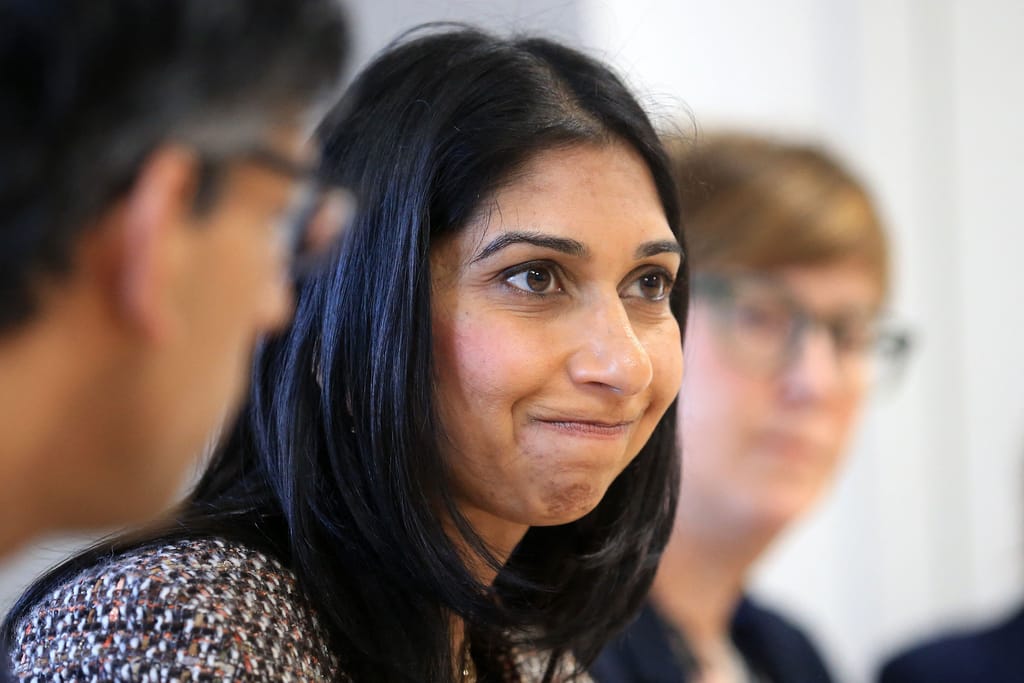
On election day 2015, Braverman was elected MP for Fareham with a huge majority of more than 22,000. She increased that to 26,000 in 2019, meaning that unlike many of her peers, she is relatively inoculated from the risk of ejection next time around.
But on entering the Commons, she did not immediately stand out as someone likely to be on the right of the party — or a future member of the Cabinet.
One former No. 10 adviser who worked for Boris Johnson when he later appointed Braverman to the Cabinet, said: “It was a surprise when the team realized the strength of her views in areas like immigration. We hadn’t really had a sense that she was that right wing before.”
The forces of Brexit
As with so many in parliament in the mid-2010s, Braverman’s course was shaped by Brexit. It proved a catalyzing force, opening unexpected doors for some, while slamming them in the faces of others, often ending careers.
Braverman, the self-declared “Francophile” who quoted French poetry on Nick Robinson’s Political Thinking podcast was in the former camp. In 2016, as Conservative MPs on both sides of the debate drew up battle lines ahead of the EU referendum, she became a fully subscribed member of Vote Leave.
Gisela Stuart, the crossbench peer and former Labour MP who chaired the Vote Leave campaign, told POLITICO: “She wasn’t very high profile at the time, so she wasn’t a leading figure. But she was definitely there and keen to do what she could.”
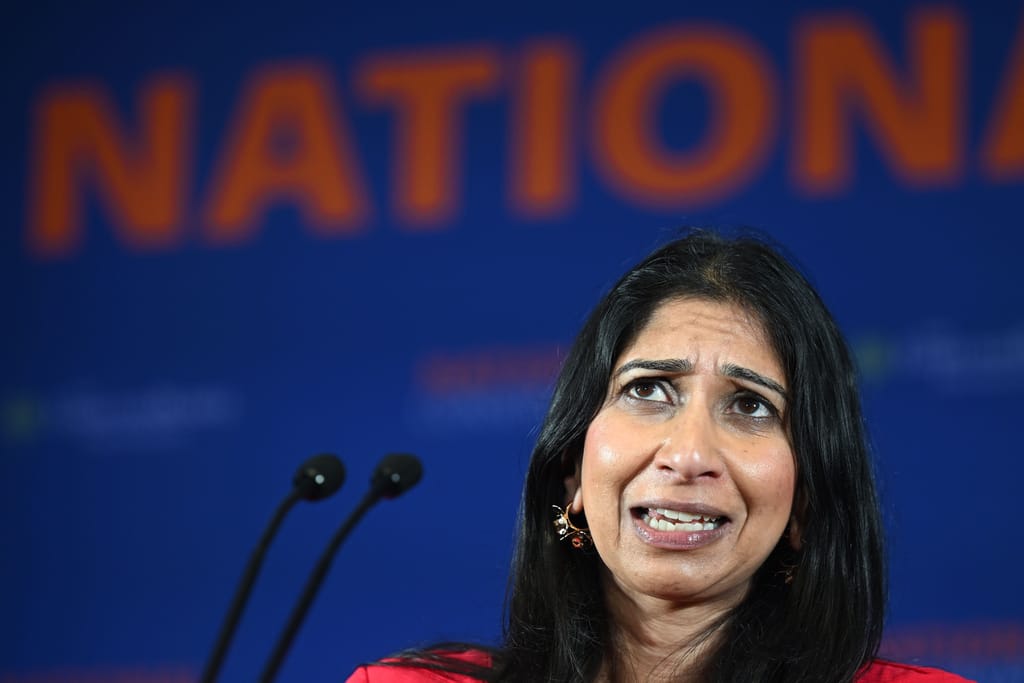
Jenkin says the experience of working on the campaign and the parliamentary ructions that followed were key to shaping Braverman’s philosophy: “I think her views have hardened, as most people’s do when you actually get there and you see it.”
After the referendum, as new prime minister Theresa May battled to deliver a Brexit deal both the country and parliament could live with, Braverman joined the “Spartans” European Research Group (ERG), a caucus of ultra-Euroskeptic MPs who campaigned first for the referendum, then to leave the EU, and finally regrouped a third time to resist May’s attempts to avoid a hard Brexit.
There Braverman came under the tutelage of fellow Brexiteers and Tory MPs Steve Baker, who later ran her leadership campaign, and her mentor John Hayes, a staunch Euroskeptic and social and economic conservative who would go on to have major influence over her political thinking.
One Tory MP said: “For people like Hayes on the right, it’s helpful to have a woman or an ethnic minority to put forward their agenda because it softens it — and Suella is obviously both so she’s perfect. It’s strange watching her with them, as if she’s been hypnotized. You see her in the voting lobbies like a rabbit in a trance being told what to do.”
After losing her majority in the disastrous 2017 election, May appointed a series of prominent Leave campaigners to her government — including Baker, leaving a vacancy at the top of the ERG which Braverman filled. Six months later, she was appointed to her first full ministerial role, serving under first David Davis and then Dominic Raab at the Department for Exiting the European Union.
Both men would resign in disgust at May’s attempts to secure a compromise deal with the EU, Braverman quitting on the same day as Raab in November 2018.
Into the Cabinet
Her return to government just over a year later, when May’s replacement Boris Johnson carried out a reshuffle in February 2020, marked a stellar rise to the Cabinet for an MP who had been in the Commons less than five years.
As attorney general, Braverman was now the most senior law officer in the country.
Most believed she was appointed by Johnson because she was one of the few lawyers in parliament who also agreed with the prime minister on Europe.
The aide quoted above rejects that analysis. “It would have been very, very difficult if he’d had anybody else who didn’t have her mindset and didn’t have the kind of risk appetite that she did.”
Braverman’s relationship with the legal profession nevertheless became strained, in part driven by her dismissal of many of her former associates as “lefty lawyers.”
She once told ConHome: “I was the ‘shy Tory’ in my Chambers of ‘right-on’ human rights lawyers.” (Some of her fellow barristers denied this characterization of the chambers to the Observer.)
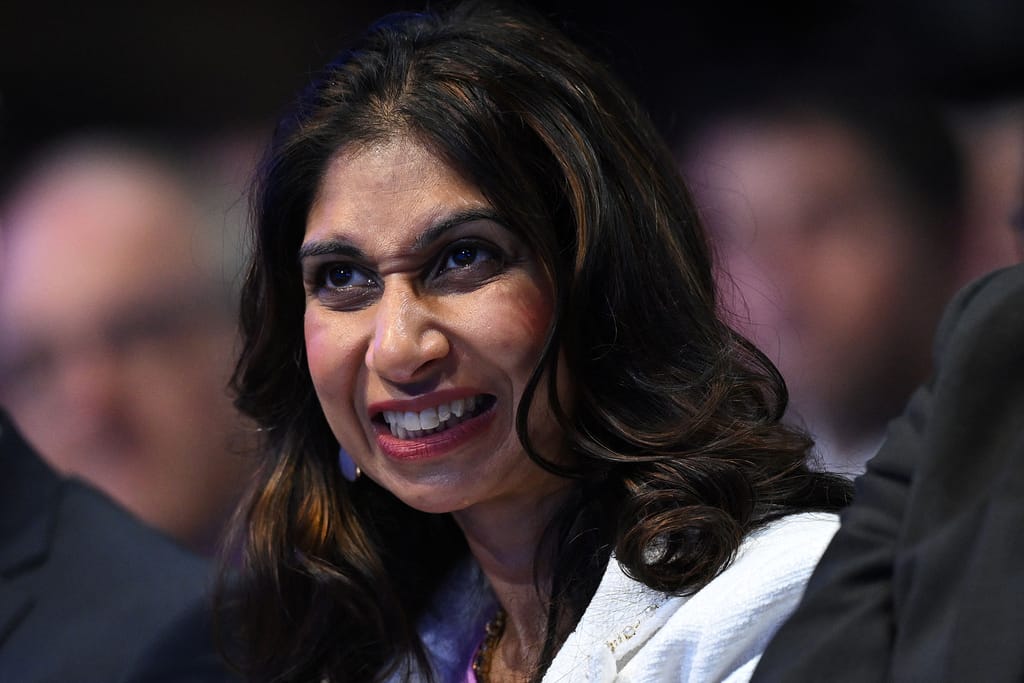
The second official quoted higher up this article said the civil service too found Braverman’s politicization of the role of attorney general uncomfortable. “I think they basically found her at times exasperating. She was a bigger personality and a bigger figure than they’d ever had before. It was a culture clash.”
That discomfort became worse when Braverman signed off on Johnson’s proposal to swerve elements of the Brexit deal he had signed by knowingly breaking international law. The second official said: “They basically thought this was unconstitutional, like — what is she doing? But … the attorney general is a political role. She is a member of the Conservative Party and Cabinet.”
One Downing Street aide from the time remembered Braverman being relaxed about the criticism she received. The only time she became unsettled, they recalled, was soon after her appointment, when questions were raised by a newspaper about a sex scandal relating to the Triratna Buddhist order, of which she is a member.
The aide said: “I remember her being really nervous and upset and taking it quite personally. Downing Street had to step in.”
Family values
By now Braverman was a married woman, having met Rael Braverman, a manager at the luxury car firm Mercedes Benz, in 2015. They wed at the House of Commons in 2018 and their first child, a boy, was born a year later. In 2021, as attorney general and pregnant with their daughter, Brvaerman became the first minister to officially take maternity leave, a move which required a change in British law.
Rael is Jewish, and moved to the U.K. as a teenager from South Africa. Preferring to keep out of the limelight, he has spoken only once at length to a newspaper, the Daily Mail, last summer when he defended his wife after the BBC football host Gary Lineker compared her language on immigration to the rhetoric used in Nazi Germany in the 1930s.
Rael told POLITICO he was hesitant about speaking to the Mail for the piece — the interview was conducted in their home and contained details about their family life — but felt it was important to stick up for his wife.
Braverman added that, again, she wasn’t a fan of the photographs which accompanied the piece: “We looked like a really miserable couple,” she joked.
In the summer of 2021, during the coup which toppled Johnson, Braverman remained loyal almost to the end.
Unlike other senior politicians, she did not, those around her insist, hold secret meetings to court support for her own leadership bid. She had, however, gone out of her way to make connections with MPs from new intakes, particularly the 2019 cohort who had struggled after entering parliament just before COVID struck.
One 2019 MP, Miriam Cates, said: “What I’ve always found so bizarre about this caricature in the media about this kind of hard, unemotional, uncompassionate far right even figure, is it’s just so far from the truth it’s almost laughable.”
Cates went on to join Braverman’s leadership campaign, working under campaign manager Steve Baker. (More recent reports suggest he would not back her in a future contest due to concerns about her outspoken attack on Asian grooming gangs.)
Fattening the pig on market day
On July 6, 2021, as a series of senior Cabinet ministers resigned in a bid to force Johnson from office, Braverman broke cover.
As the PM’s fate hung in the balance, she was booked to appear on ITV’s evening politics program, Peston.
In the green room, she ran into the disgraced former Health Secretary Matt Hancock, who said: “What are you doing? You can’t possibly be defending [Johnson], still, over this?”
She responded “No, I’m attacking him and calling him to resign.” One eyewitness said: “He was speechless for a few seconds — which is quite rare for Matt Hancock.”
Braverman explained to Peston that to maintain the stability of the government, she would not quit — but that she thought Johnson’s departure was inevitable and declared she would stand in the leadership contest that would follow. It was a key moment in her propulsion to the ranks of senior politician.
Johnson finally quit three days later, triggering a whirlwind leadership campaign. Braverman’s former aide said of her run to replace him: “It definitely wasn’t slick, [and] in hindsight obviously couldn’t have worked. But I think we think we did feel like it was possible, until near the end.”
Asked why Braverman had run at all, the official said: “I think it’s because she really believes that she knows what the country needs. [But] to have been successful, she would have had to have a lot more — you can’t fatten a pig on market day.”
Tory MP and ally Cates added: “Unlike some of the other candidates, she hadn’t been preparing for this for months. She didn’t have a campaign or a website, nothing like that. We had to put that together quite quickly.”
Braverman’s audacious bid was ultimately torpedoed when several other MPs on the right of the party also stood for leader, splitting the right-wing vote. The ERG vote was divided between Braverman and Liz Truss, who went on to triumph over Rishi Sunak in the final ballot of members.
Despite being defeated in the second round of voting, Braverman was seen to have enjoyed a good contest, leaving with an elevated public profile. When she went on to back Truss, her reward was to be made home secretary in September.
What followed was an extraordinary period in which she was fired for leaking a secret document to her ally John Hayes, only to be reappointed to the role eight days later when Sunak succeeded Truss as prime minister, and urgently needed to shore up right-wing MP support. Braverman has since extolled her brand of anti-woke, low immigration conservativism at the Home Office.
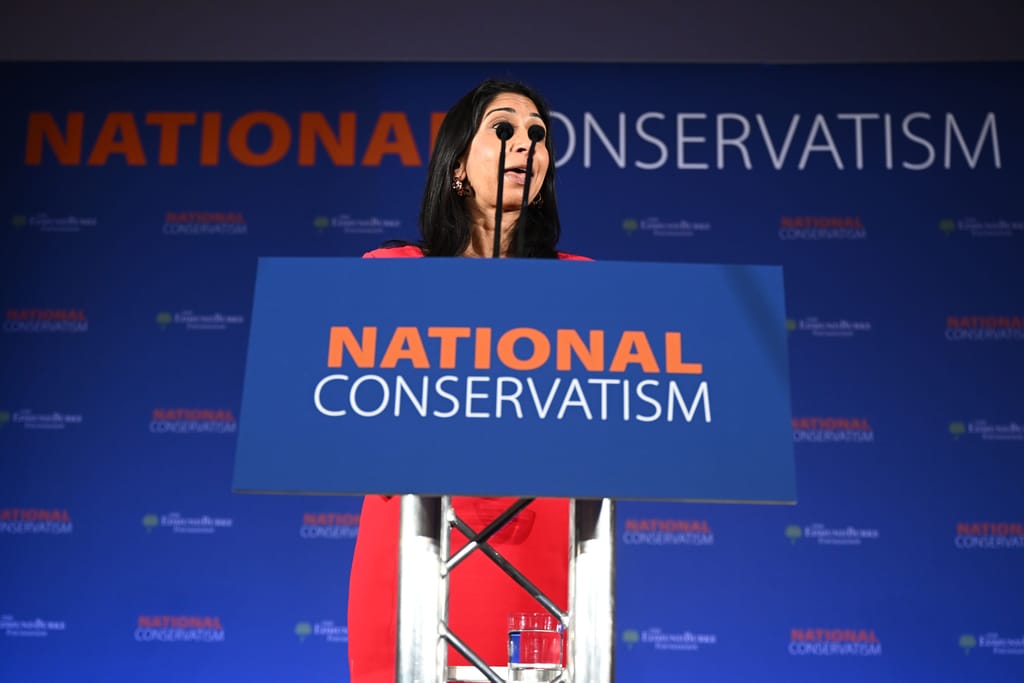
And her pronouncements, such decrying the “Guardian reading, tofu eating wokerati” or saying it was her “dream” to see immigrants sent to Rwanda, continue to divide.
So what explains Braverman’s seeming addiction to controversy. One of the former students quoted above wonders if her language is the ultimate nerd’s revenge. “Was the fact she was so much disliked at Queens’ behind the fact that she’s now going to prove all those fucking Guardian reading, limp wristed, lefty tofu eaters wrong?” he postulated.
Lawyers POLITICO spoke to for this article suggested something similar — that the criticism she received about her lack of experience perhaps fueled her desire to defy the profession.
Future leader?
Or is it something more cynical? On TimesRadio this week, the Conservative peer Daniel Finkelstein said: “What she wants to be is the outrider. And what she wants to be is the right wing candidate of the next leadership election.”
Tim Bale thinks her appeal is shallow, however — and that rhetoric is a cover for a lack of progress on Braverman and Sunak’s key pledge to stop small boat crossings.
He also believes comments such as her “dream” Rwanda remark could prove counterproductive to her ambitions of leading her party.
“That was odd,” Bale said. “It combined … puppyishness … with meanness. She’s both one of the 101 Dalmatians and Cruella de Vil at the same time.
“I do wonder whether that does alienate some people, the fact that she almost enjoys being the pantomime baddie.”
Former Tory mayoral candidate Samuel Kasumu, who is Black, agrees: “She’s obviously gone too far. Her rhetoric is too divisive.”
Tory peer, Sayeeda Warsi, also sees Braverman as a malign force. She told Sky News in recent days: “She fights culture wars. She doesn’t fix things. She breaks things.”
Despite the rhetoric, or perhaps because of it, in Hayes’ words, Braverman was the “darling” of last month’s Tory party conference, where delegates treated her like something close to a rock star.
Can she translate this to a successful leadership campaign second time around? Should Sunak falter at the polls in next year’s general election, it’s a safe bet she’ll be in with a chance.

